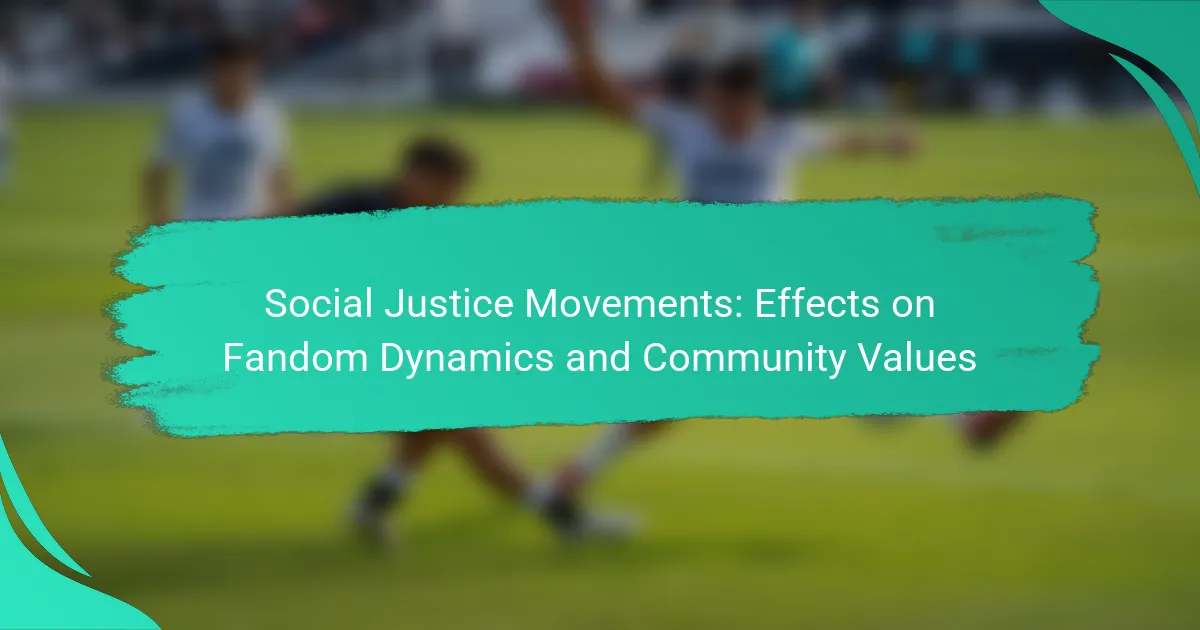Social justice movements are transforming fandom dynamics by promoting inclusivity and encouraging active participation among fans. These movements challenge traditional norms, fostering a diverse community that values equity and representation, while also raising awareness of social issues that affect their collective identity.
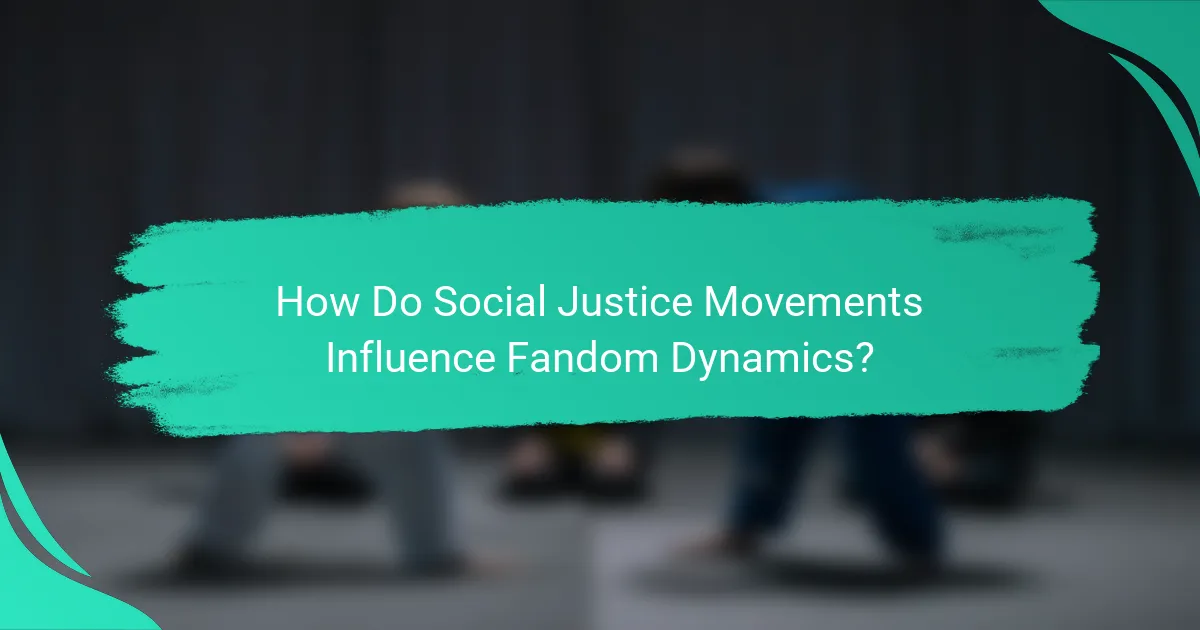
How Do Social Justice Movements Influence Fandom Dynamics?
Social justice movements significantly reshape fandom dynamics by fostering inclusivity and encouraging active participation. These movements challenge traditional norms, leading to a more engaged and diverse community that prioritizes equity and representation.
Increased community engagement
Social justice movements have led to heightened community engagement within fandoms. Fans are more likely to participate in discussions, attend events, and support causes that align with their values. This engagement often manifests through online platforms, where fans organize campaigns and share resources to promote social justice.
For example, fandoms may mobilize around issues such as representation in media, advocating for diverse characters and storylines. This collective action not only strengthens community bonds but also amplifies the voices of marginalized groups within the fandom.
Shift in content creation
The influence of social justice movements has prompted a notable shift in content creation among fans and creators alike. Many creators are now prioritizing inclusive narratives that reflect diverse experiences and perspectives. This shift encourages a broader range of stories that resonate with a wider audience.
Fans are also producing content that challenges stereotypes and promotes social justice themes. This can include fan fiction, art, and videos that highlight issues such as racism, sexism, and [censured] rights, fostering a culture of awareness and advocacy within the fandom.
Changes in fan interactions
As social justice movements gain traction, fan interactions have evolved to become more respectful and supportive. Fans are increasingly mindful of the language they use and the impact of their words, leading to healthier discussions and debates. This shift encourages a culture of empathy and understanding, where differing opinions can be shared constructively.
Additionally, fandoms are adopting codes of conduct that promote inclusivity and discourage harmful behavior. These guidelines help create safe spaces for all fans, ensuring that everyone feels welcome and valued regardless of their background or identity.
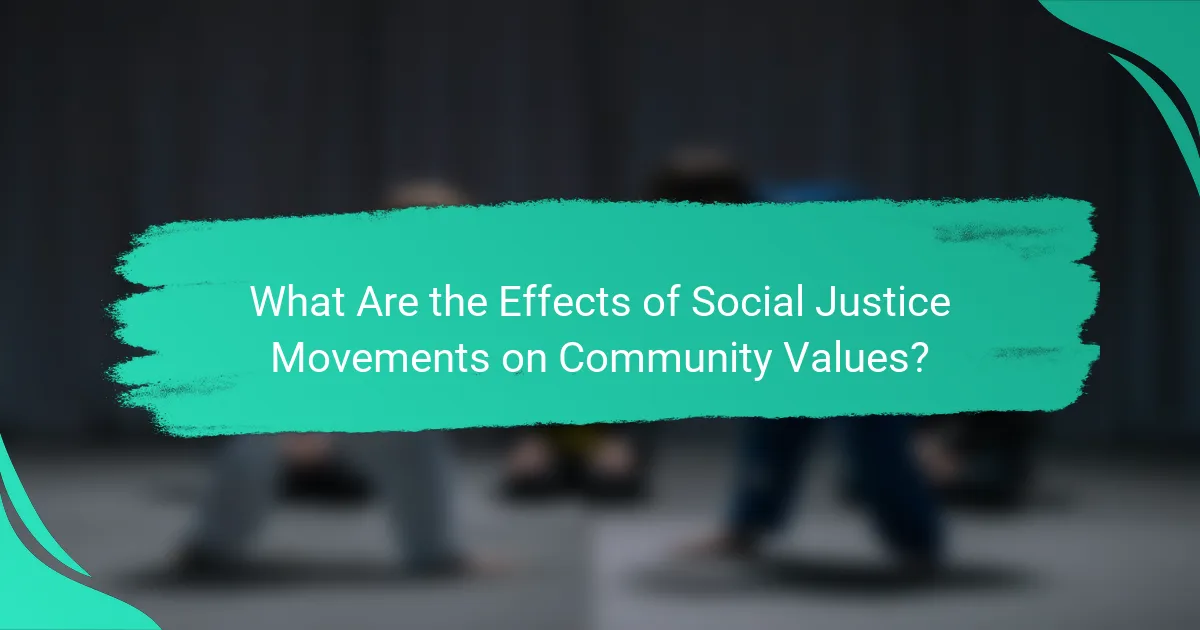
What Are the Effects of Social Justice Movements on Community Values?
Social justice movements significantly reshape community values by promoting inclusivity and raising awareness of social issues. These changes foster environments where diverse perspectives are acknowledged and respected, ultimately enhancing the overall dynamics of fandoms.
Enhanced inclusivity
Enhanced inclusivity in fandoms means creating spaces where individuals from various backgrounds feel welcomed and valued. This shift often leads to more diverse representation in media, allowing fans to see themselves reflected in the stories they love.
Communities can implement practices such as inclusive language, diverse casting in fan projects, and open discussions about representation. For instance, organizing events that celebrate different cultures or identities can strengthen bonds among members and encourage participation from underrepresented groups.
Greater awareness of social issues
Greater awareness of social issues within fandoms encourages members to engage critically with the content they consume. Fans are increasingly discussing topics like racism, sexism, and environmental concerns, which can lead to more informed and responsible community behavior.
To foster this awareness, communities can host panels, workshops, or discussions that focus on relevant social issues. Engaging with content that highlights these themes, such as documentaries or literature by marginalized voices, can also enhance understanding and empathy among fans.
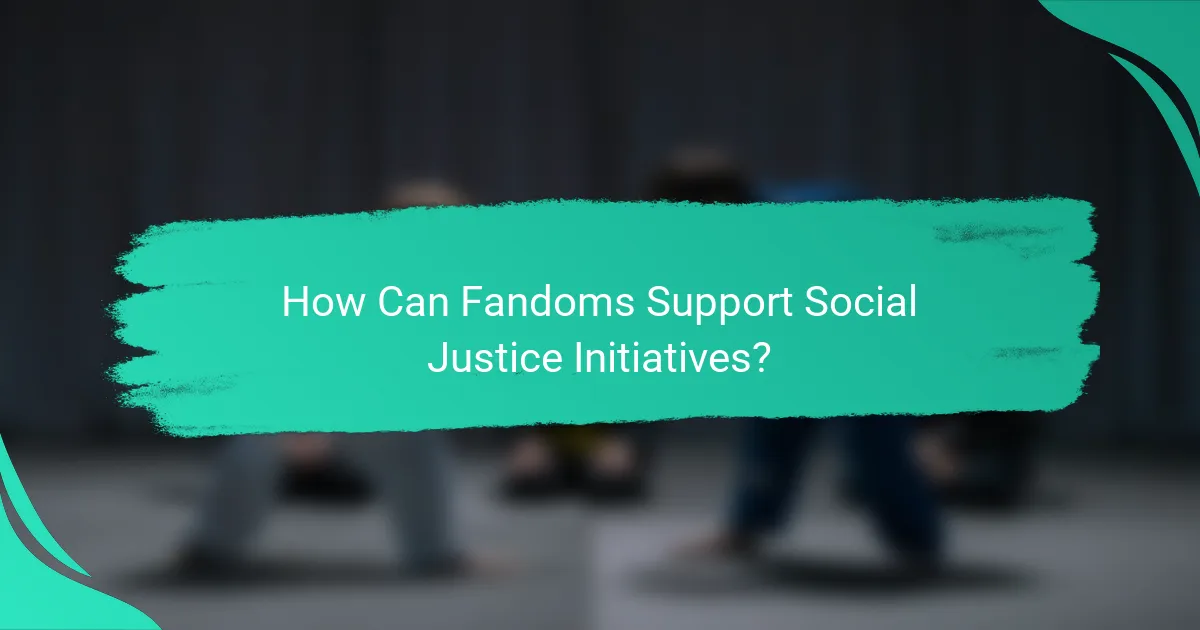
How Can Fandoms Support Social Justice Initiatives?
Fandoms can play a significant role in supporting social justice initiatives by mobilizing their communities to take action and raise awareness. Through organized efforts, fans can contribute to meaningful change and promote values of inclusivity and equity within their spheres of influence.
Organizing charity events
Fandoms can organize charity events to raise funds for social justice causes. These events can range from virtual fundraisers, such as live-streamed gaming marathons, to in-person conventions featuring auctions or donation drives. Engaging fans in these activities not only generates financial support but also fosters a sense of community and shared purpose.
When planning charity events, consider partnering with established organizations to ensure transparency and effectiveness. Set clear fundraising goals and communicate how the funds will be used, which can motivate fans to contribute. For example, a fandom could aim to raise a few thousand USD to support local advocacy groups or educational programs.
Creating awareness campaigns
Creating awareness campaigns allows fandoms to educate their members about social justice issues and encourage advocacy. These campaigns can utilize social media platforms, fan forums, and newsletters to share information, resources, and calls to action. A well-crafted campaign can amplify voices and highlight important topics, such as racial equality or [censured] rights.
To maximize impact, fandoms should focus on clear messaging and engaging content, such as infographics or personal stories. Collaborating with influencers or prominent figures within the fandom can also enhance visibility. For instance, a campaign might feature a series of posts highlighting the experiences of marginalized creators in the community, encouraging fans to support their work directly.
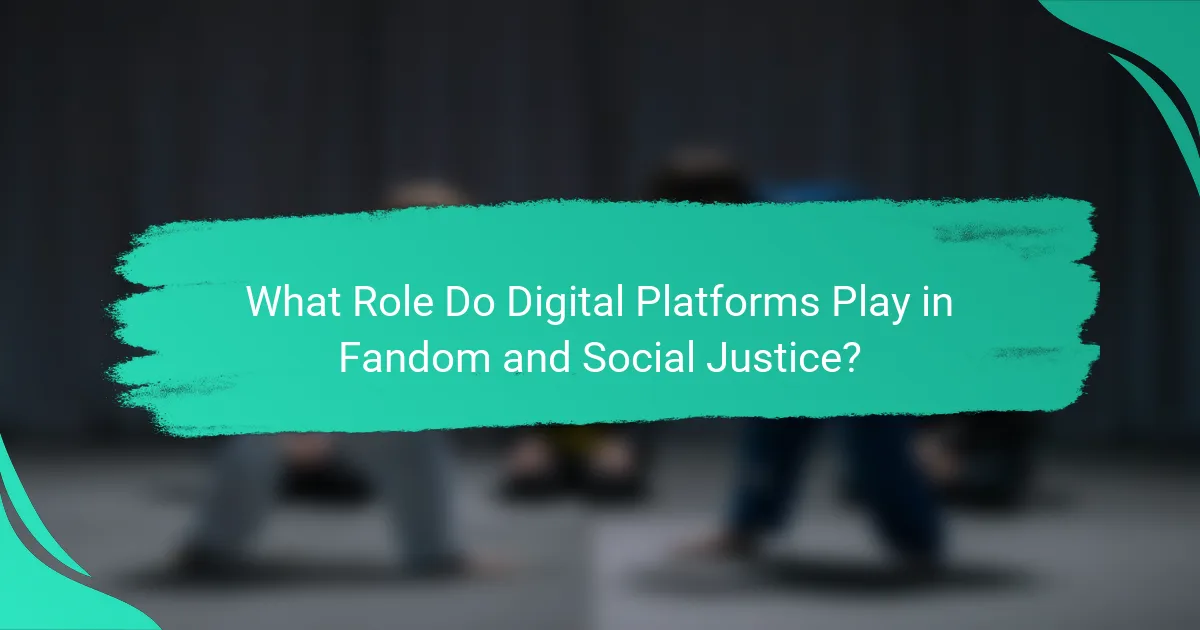
What Role Do Digital Platforms Play in Fandom and Social Justice?
Digital platforms serve as crucial spaces where fandoms intersect with social justice movements, enabling fans to engage in activism and community-building. These platforms facilitate communication, resource sharing, and mobilization around social issues relevant to fan communities.
Facilitating discussions
Digital platforms provide fans with the opportunity to engage in meaningful discussions about social justice issues within their fandoms. Forums, social media groups, and dedicated websites allow fans to share their perspectives, experiences, and insights, fostering a sense of community and solidarity.
For example, platforms like Twitter and Reddit often host threads where fans can discuss representation, inclusivity, and ethical practices in media. These discussions can lead to greater awareness and collective action among fans, influencing how content creators approach their work.
Providing resources for activism
Digital platforms are essential for disseminating resources that empower fans to participate in social justice activism. Many fandoms utilize these platforms to share petitions, fundraising campaigns, and educational materials related to various causes.
Fans can easily access information about ongoing movements, such as Black Lives Matter or [censured] rights, and find ways to contribute. For instance, a fan community might compile a list of organizations to support, along with links for donations or volunteer opportunities, making it easier for members to take action.
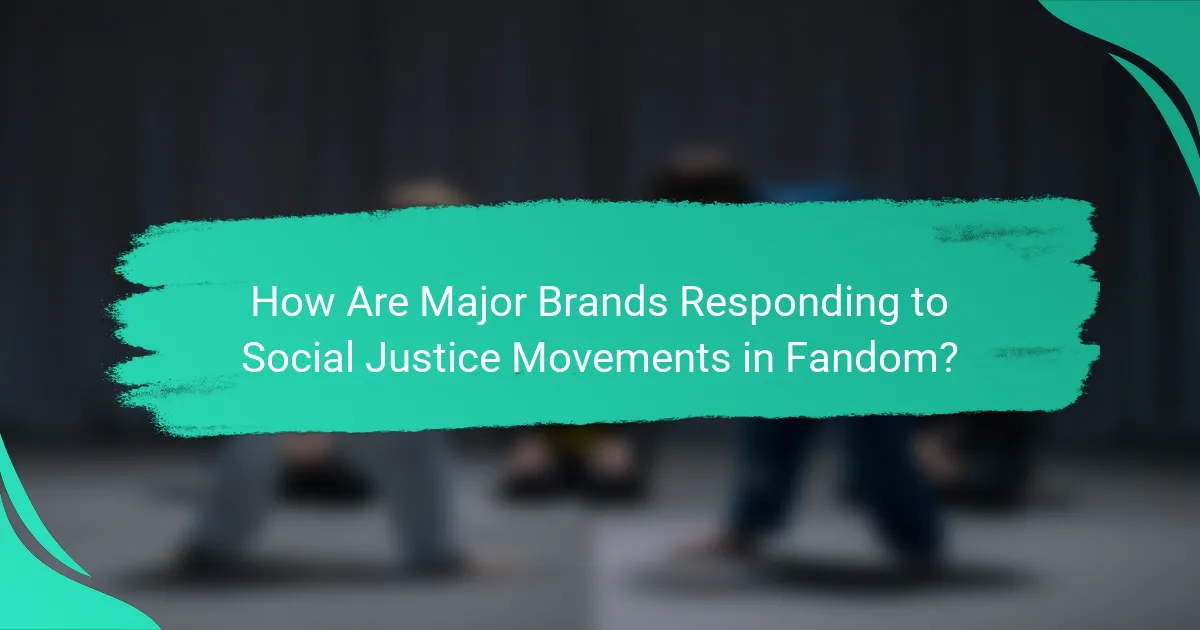
How Are Major Brands Responding to Social Justice Movements in Fandom?
Major brands are increasingly aligning their marketing strategies with social justice movements in fandom by adopting inclusive practices and engaging with activists. This shift reflects a growing recognition of the importance of community values and the need for brands to resonate with diverse audiences.
Inclusive marketing strategies
Inclusive marketing strategies focus on representing diverse voices and experiences within brand messaging. Brands are now prioritizing campaigns that feature individuals from various backgrounds, including different races, genders, and abilities, to foster a sense of belonging among fans.
For example, brands may create advertisements that showcase a range of characters and stories, appealing to a broader audience. This approach not only enhances brand loyalty but also encourages positive community engagement, as fans feel seen and valued.
Collaborations with activists
Collaborations with activists allow brands to amplify social justice messages and support community initiatives. By partnering with activists, companies can leverage their platforms to raise awareness about critical issues and drive meaningful change.
These collaborations can take various forms, such as co-branded merchandise, social media campaigns, or sponsorship of events that promote social justice causes. Brands should ensure that these partnerships are authentic and align with their core values to avoid backlash from fans who may view them as opportunistic.
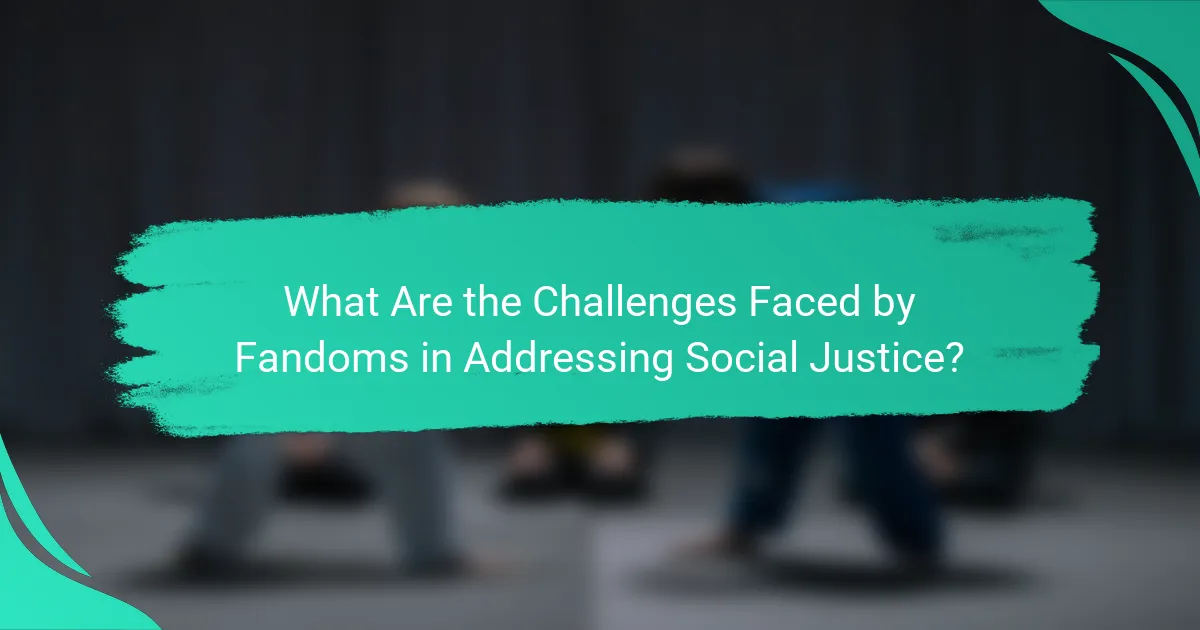
What Are the Challenges Faced by Fandoms in Addressing Social Justice?
Fandoms face significant challenges in addressing social justice, primarily due to differing values and resistance from various community members. These challenges can lead to conflicts over representation, inclusivity, and the overall direction of fan culture.
Resistance from traditional fans
Traditional fans often resist social justice initiatives, viewing them as threats to the core elements of their fandom. This resistance can manifest in backlash against new narratives or characters that promote diversity and inclusion, leading to heated debates within the community.
For example, when a popular franchise introduces a character from an underrepresented group, some long-time fans may express dissatisfaction, arguing that it undermines established lore. This pushback can create a divide, making it difficult for fandoms to unite around shared values.
Balancing diverse perspectives
Fandoms must navigate a complex landscape of diverse perspectives when addressing social justice issues. Balancing these viewpoints requires open dialogue and a willingness to listen to all community members, especially those from marginalized backgrounds.
One effective approach is to create forums or discussion groups where fans can share their thoughts and experiences related to social justice. This can foster understanding and help bridge gaps between differing opinions, ultimately leading to a more inclusive fandom environment.
